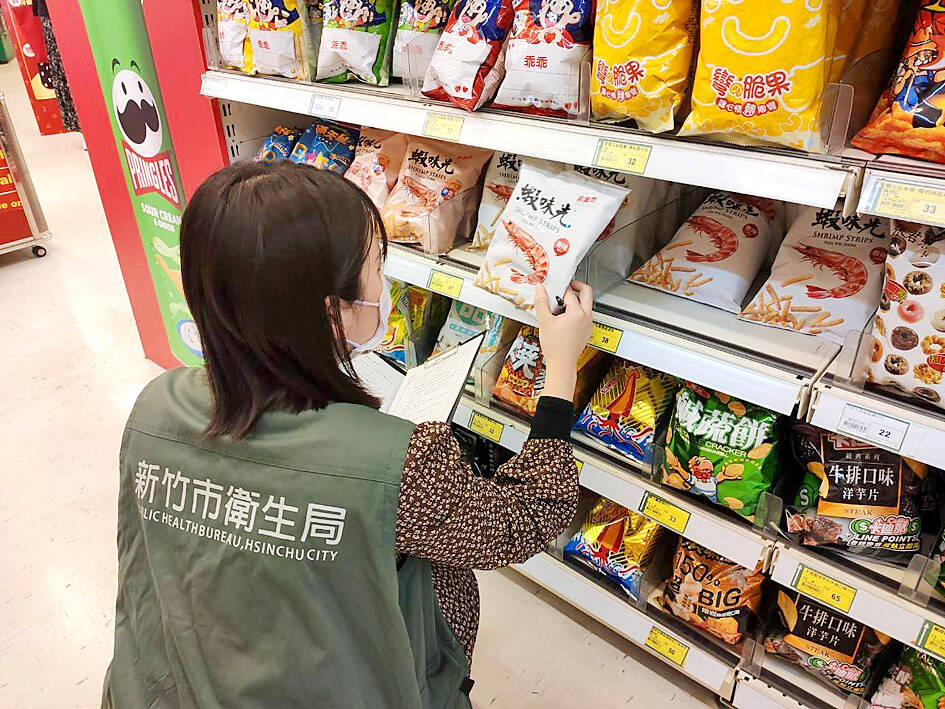The Food and Drug Administration (FDA) yesterday suspended chili pepper powder imports from China from 21 importers and manufacturers for three months after their products were found to contain Sudan III, a coloring agent banned in food in Taiwan.
A policy to test every shipment of chili powder imports from China, in effect since Dec. 11 last year, is to continue until June 10, FDA officials told a news conference, adding that more than 1.06 tonnes of products were recalled as of Monday.
The family of substances known as “Sudan reds” are categorized as Group II carcinogens by the WHO and typically used as an industrial dye for oils, wax and polymers, said Yen Tsung-hai (顏宗海), a toxicology expert at Linkou Chang Gung Memorial Hospital.

Photo courtesy of Hsinchu City Public Health Bureau
Sudan reds have been linked to increased cancer rates in lab animals and human consumption of the substance can lead to the formation of amines, a probable carcinogen for humans, Yen said.
PX Mart Co (全聯實業) has recalled all 11,824 chili powder bottles of the affected batch bearing an expiration date of Dec. 12 next year, the FDA said.
An investigation found that the contaminated material came from a shipment of Chinese chili powder imported by Bao Hsin Enterprises Co Ltd (保欣企業有限公司), FDA Deputy Director-General Lin Chin-fu (林金富) said.
The New Taipei City Department of Health on Feb. 9 found four parts per billion of Sudan III in samples taken from that shipment, resulting in the recall of food products by five additional manufacturers, including Yuzhong Food’s (裕榮食品股份有限公司) popular shrimp-flavored snacks, Lin said.
Ho Ho Yuan International Trade Co (禾禾園國際貿易有限公司), Shen Yan Co (申元有限公司), Yun Fang Spice Processing Factory (永芳香料加工所), Sun Sheng Foods Co (順盛食品原料有限公司) and Mares International Trading Co (瑪爾氏國際貿易) were among the companies that issued recalls, in addition to a company that appeared to have used an unaffected batch of chili powder, Lin said.
Food safety officials are confident that all affected manufacturers and distributors have been identified and no tainted products are on store shelves, he said.
The Yunlin County Public Health Bureau has filed a criminal complaint with the Yunlin District Prosecutors’ Office, the FDA said.
The agency increased the test coverage of chili powder from China to all shipments after observing a surge in consignments that failed food safety standards, Lin said.
Eight months before the FDA imposed the new standards, 172 shipments of Chinese chili powder were imported into Taiwan, of which 98 were inspected and 24 failed tests, a failure rate of about 25 percent, he said.
The tainted powder that ended up in the supply chain was imported on Oct. 23 last year before the standards were enhanced, he said.
The use of Sudan reds in food is punishable by up to seven years in prison commutable to an NT$80 million (US$2.54 million) fine, FDA Director-General Wu Shou-mei (吳秀梅) said.
Importing a food product without valid documentation, including its point of origin, is punishable by a NT$200 million fine and the possible suspension of the affected product line or company, Wu said.

AGING: As of last month, people aged 65 or older accounted for 20.06 percent of the total population and the number of couples who got married fell by 18,685 from 2024 Taiwan has surpassed South Korea as the country least willing to have children, with an annual crude birthrate of 4.62 per 1,000 people, Ministry of the Interior data showed yesterday. The nation was previously ranked the second-lowest country in terms of total fertility rate, or the average number of children a woman has in her lifetime. However, South Korea’s fertility rate began to recover from 2023, with total fertility rate rising from 0.72 and estimated to reach 0.82 to 0.85 by last year, and the crude birthrate projected at 6.7 per 1,000 people. Japan’s crude birthrate was projected to fall below six,

US President Donald Trump in an interview with the New York Times published on Thursday said that “it’s up to” Chinese President Xi Jinping (習近平) what China does on Taiwan, but that he would be “very unhappy” with a change in the “status quo.” “He [Xi] considers it to be a part of China, and that’s up to him what he’s going to be doing, but I’ve expressed to him that I would be very unhappy if he did that, and I don’t think he’ll do that. I hope he doesn’t do that,” Trump said. Trump made the comments in the context

SELF-DEFENSE: Tokyo has accelerated its spending goal and its defense minister said the nation needs to discuss whether it should develop nuclear-powered submarines China is ramping up objections to what it sees as Japan’s desire to acquire nuclear weapons, despite Tokyo’s longstanding renunciation of such arms, deepening another fissure in the two neighbors’ increasingly tense ties. In what appears to be a concerted effort, China’s foreign and defense ministries issued statements on Thursday condemning alleged remilitarism efforts by Tokyo. The remarks came as two of the country’s top think tanks jointly issued a 29-page report framing actions by “right-wing forces” in Japan as posing a “serious threat” to world peace. While that report did not define “right-wing forces,” the Chinese Ministry of Foreign Affairs was

PREPAREDNESS: Given the difficulty of importing ammunition during wartime, the Ministry of National Defense said it would prioritize ‘coproduction’ partnerships A newly formed unit of the Marine Corps tasked with land-based security operations has recently replaced its aging, domestically produced rifles with more advanced, US-made M4A1 rifles, a source said yesterday. The unnamed source familiar with the matter said the First Security Battalion of the Marine Corps’ Air Defense and Base Guard Group has replaced its older T65K2 rifles, which have been in service since the late 1980s, with the newly received M4A1s. The source did not say exactly when the upgrade took place or how many M4A1s were issued to the battalion. The confirmation came after Chinese-language media reported